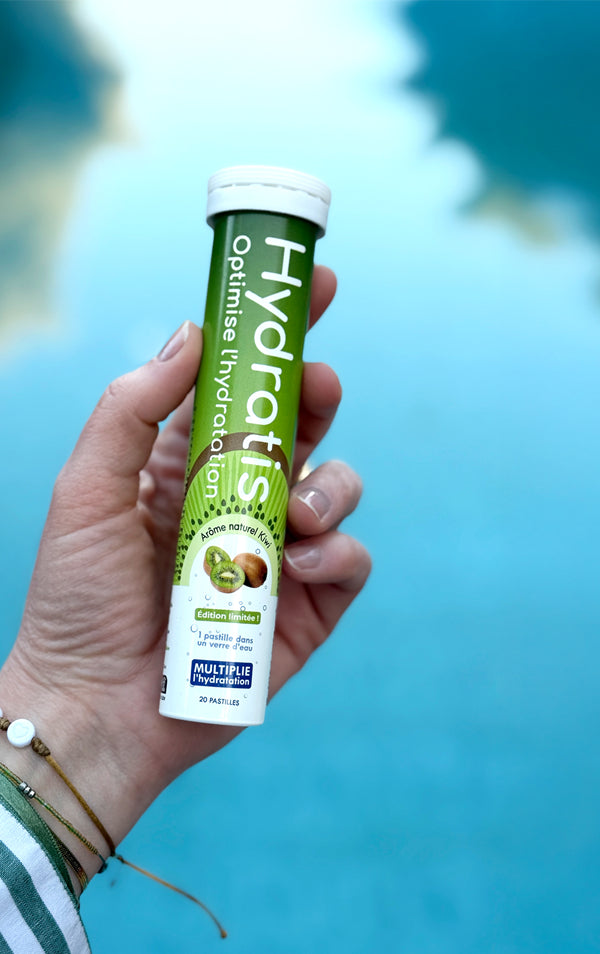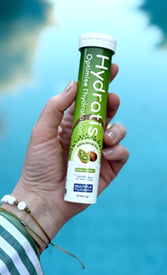The intense heat doesn't just cause extreme fatigue . It can also disrupt your digestive system , leading to diarrhea, stomach aches , or bloating . These problems further weaken your body, which is already vulnerable to dehydration during a heatwave . In this article, we explain the link between heat and diarrhea and give you simple tips to minimize the risks and react effectively.
Heatstroke, sunstroke, dehydration: what are we talking about?
What is heatstroke?
Heatstroke occurs when your body temperature exceeds 40°C and your natural regulatory mechanisms are no longer sufficient to cool you down. Unlike sunstroke , which is linked to direct exposure to the sun , you can be affected even in the shade.
If you notice signs such as: red and dry skin , confusion, loss of consciousness or convulsions, go to the emergency room quickly for appropriate care as the prognosis may be life-threatening.
How can you tell if you have heatstroke?

Sunstroke This corresponds to an overheating of the body caused by prolonged sun exposure or intense physical activity . It manifests as headaches , nausea , extreme fatigue , fever , and sometimes diarrhea . Although generally less serious than hyperthermia, it can lead to complications if treatment is not received promptly.
The right reflexes : at the first symptoms, get into the shade, hydrate yourself and cool your body (damp towel, lukewarm shower, ventilation).
What is dehydration?
Dehydration occurs when you lose more fluids and minerals than you absorb ( through sweating, diarrhea, vomiting ). During heat waves, this risk is amplified. It can be both a consequence of hyperthermia or heatstroke , and an aggravating factor, as it disrupts intestinal function.
Who is most at risk?
- Infants and young children.
- Older people, who feel less thirsty and regulate their losses less well.
- Athletes , due to massive losses through perspiration.
- Patients who are taking diuretic, laxative, or certain antibiotic medications.
Why do we get diarrhea in the summer?
In summer, food left at room temperature or improperly stored quickly becomes a breeding ground for bacteria ( Salmonella, Escherichia coli ). The risk of gastroenteritis then increases sharply.
Abroad, you can also develop " traveler's diarrhea ." According to According to Vidal , this infectious disease affects between 25 and 60% of people in tropical or subtropical areas . The causes are numerous: food contamination, parasites, viruses , or consumption of unsafe water.
The direct impact of heat on your intestines
When the outside temperature rises, your body tries to cool down. To do this, it dilates blood vessels and directs blood flow to the skin . The digestive system then receives less oxygen , which slows its ability to properly digest and absorb nutrients.
Furthermore , heat stress It can alter the balance of the gut microbiota, that is, the bacteria that play a role in your digestion, and thus cause reactions such as bloating and looser or more liquid stools. These effects are often more pronounced if you already suffer from a chronic digestive disorder , such as irritable bowel syndrome . or certain inflammatory diseases.
The vicious cycle of heatwave – diarrhea – dehydration
During hyperthermia , inflammation disrupts your digestive system. Fluid loss reduces nutrient absorption, promotes frequent bowel movements, and increases intestinal fragility .
A true vicious cycle takes hold:
- Heat stroke and sunstroke cause a loss of fluids and minerals .
- Dehydration worsens digestive problems , including diarrhea.
- This last point leads to even more losses.
How to prevent and treat these disorders in the summer?
Preventing sunstroke and dehydration

Adopt a few simple habits:
- Avoid the sun between 10am and 4pm.
- Wear a hat and light clothing.
- Drink regularly in small sips, even if you are not thirsty.
- Use oral rehydration solutions (ORS) if necessary .
- Consume fresh, well-washed and refrigerated food.
- Limit intense physical exertion.
You can also use Hydratis tablets to compensate for mineral losses.
How to treat heat-related diarrhea?
Prioritize oral rehydration with water , broths, or an ORS-type solution. Rest your digestive system by consuming easily digestible foods such as bananas, rice, or applesauce. Avoid fatty and spicy foods , as well as alcohol and coffee.
Consult a doctor promptly if symptoms persist for more than 48 hours, if you observe blood in your stool, or if your fever increases.
The right things to do in case of heatstroke
Immediately cool the person down (warm shower, damp towels), move them to a cool place, and give them small sips of water . If you are outside, air-conditioned shops will be your best bet.
If his condition worsens, contact emergency services immediately.
Frequently Asked Questions (FAQ)
Why do I get diarrhea in the summer?
Primarily due to foodborne illnesses exacerbated by heat, but also dehydration and heat stress.
Does heat affect the intestines?
Yes. It disrupts digestion and the gut microbiota, which promotes bloating and loose stools.
What are the 4 signs of heatstroke?
Temperature > 40 °C, extreme fatigue or confusion, red and dry skin, absence of perspiration.
Why the sudden diarrhea?
It can be linked to food poisoning, heat stress, digestive disease, or heatstroke.
Conclusion: Better understanding the effects of heat to protect your digestive health
In summer, heat and diarrhea form a formidable duo that can severely test your health ! To limit complications, adopt the right preventative measures and react quickly at the first signs of symptoms .
Remember : the duration of a bout of diarrhea can vary from a few hours to several days, depending on your medical history and overall health. If in doubt, don't hesitate to consult a healthcare professional, whether for yourself, your child, or anyone who is vulnerable. You can always find reliable information from your doctor or pharmacist.
Bibliography
Asmara, IGY (2020 ). Diagnosis and management of heatstroke . Acta Medica Indonesiana, 52 (1), 90–97. https://pubmed.ncbi.nlm.nih.gov/32291378/
VIDAL. (2024, July 10). Traveler's diarrhea or Turista . VIDAL.
https://www.vidal.fr/sante/voyage/maladies-voyage/diarrhee-turista.html
Gisolfi, C.V. (1993) . Effects of exercise and heat on gastrointestinal function. In BM Marriott (Ed.), Nutritional needs in hot environments: Applications for military personnel in field operations (pp. 103–120). Washington, DC: National Academies Press.
Gotfried, J. (2025, May) . General review of gastroenteritis . MSD Manuals.






